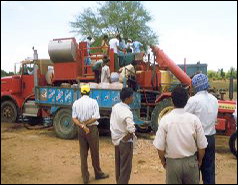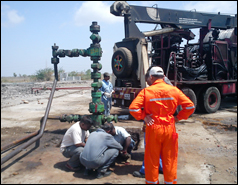Case Studies
MEOR (Microbial Enhanced Oil Recovery) Technology
 Ageing of oil fields is a perpetual and crucial concern facing the global oil industry. Thousands of oil wells in such fields fall in the category of stripper wells producing small to insignificant quantities of oil. To enhance oil production from these stripper wells, joint research of ONGC, IRS & TERI lead to improved Microbial technology of cultured set of microbes that could survive temperatures as high as 90ºC, air pressure up to 140 kilograms per square centimeter, and strong salinity with concentration levels ranging from 4% to 8%. These microbes were successfully field tested in oil wells of Gujarat and Assam and the application of this technology is through Huff & Puff method where microbial injection & oil production is done through the same well.
Ageing of oil fields is a perpetual and crucial concern facing the global oil industry. Thousands of oil wells in such fields fall in the category of stripper wells producing small to insignificant quantities of oil. To enhance oil production from these stripper wells, joint research of ONGC, IRS & TERI lead to improved Microbial technology of cultured set of microbes that could survive temperatures as high as 90ºC, air pressure up to 140 kilograms per square centimeter, and strong salinity with concentration levels ranging from 4% to 8%. These microbes were successfully field tested in oil wells of Gujarat and Assam and the application of this technology is through Huff & Puff method where microbial injection & oil production is done through the same well.
Read More
Oilzapper (Bioremediation) Technology
 Bioremediation of oil spill site in Gujarat oil field in India (Western India)
In June 2008 there was accidental oil spill near city of Gujarat (Western India) due to crude oil trunk line rapture. Crude oil was spread in large area in farm land. However, land was vacant, thus there was not much loss of crops. This trunk pipeline was being used for transportation of crude oil from oil producing field to the Gujarat Refinery in Baroda City of India. Oil producing company took immediate action and stop pumping of crude oil in affected trunk line. Oil Company also immediately barricaded the oil spill site and also prevented the spread of crude oil. The Oil company recovered substantial amount of crude oil accumulated in low lying area at spill site.
Bioremediation of oil spill site in Gujarat oil field in India (Western India)
In June 2008 there was accidental oil spill near city of Gujarat (Western India) due to crude oil trunk line rapture. Crude oil was spread in large area in farm land. However, land was vacant, thus there was not much loss of crops. This trunk pipeline was being used for transportation of crude oil from oil producing field to the Gujarat Refinery in Baroda City of India. Oil producing company took immediate action and stop pumping of crude oil in affected trunk line. Oil Company also immediately barricaded the oil spill site and also prevented the spread of crude oil. The Oil company recovered substantial amount of crude oil accumulated in low lying area at spill site.
Read More
WDP (Wax Deposition Prevention) / PDB (Paraffin Deposition Bacteria)
 Paraffinic crude oil flows freely at high temperatures through oil wells and pipes and conduits carrying oil; however at below 30°C temperature the paraffinic begins to precipitate out and deposit in oil well tubing and surface flow lines. These deposits keep getting thicker and more complex due to deposition of asphaltenes, paraffins, clay and corrosion products keep adding onto them. Eventually there is a complete blockage of oil pipeline and crude oil stop flowing through these pipelines.
Paraffinic crude oil flows freely at high temperatures through oil wells and pipes and conduits carrying oil; however at below 30°C temperature the paraffinic begins to precipitate out and deposit in oil well tubing and surface flow lines. These deposits keep getting thicker and more complex due to deposition of asphaltenes, paraffins, clay and corrosion products keep adding onto them. Eventually there is a complete blockage of oil pipeline and crude oil stop flowing through these pipelines.
Conventional techniques for control of paraffin deposition in the oil pipelines are highly expensive and plagued with other associated problems. Steam, chemicals and solvents are used to dissolve the paraffin deposition are also expensive and environmentally hazardous.
Read More
